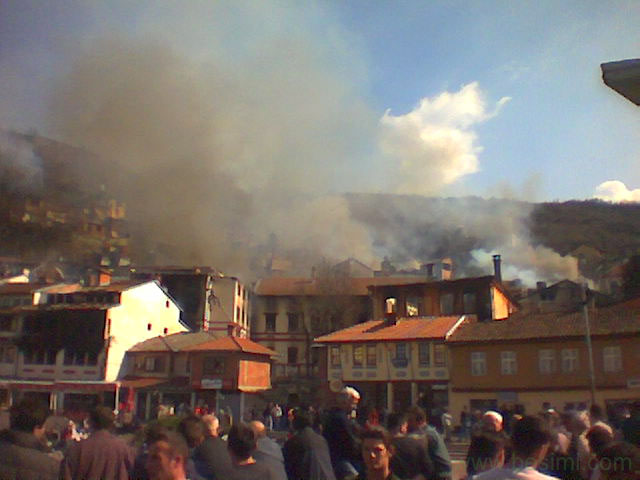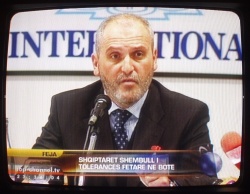Indholdsfortegnelse
Klik på markørerne nedenfor
Samlet opgørelse
[X] Dræbte, sårede, flygtede, ødelagte kirker og klostre
Tekst- og billedreportager: [X] BBC
[X] Den Serbiske Koordineringskomité

[X] Videofilm af hærværk på St Elijah i Podujevo 19.03.2004
Informationer under urolighederne og umiddelbart derefter
[X] Informationer fra NATO og KFOR
[X] Informationer fra UNMIK
[X] Informationer fra Hærens Operative Kommando
[X] UNMIK-Politiets døgnrapport for 17.03.2004
[X] UNMIK-Politiets døgnrapport for 21.03.2004
[X] UNMIK-Politiets døgnrapport for 23.03.2004
[X] UNMIK-Politiets døgnrapport for 25.03.2004
[X] Arrestation af Sukri Buja
[X] Arrestation af Avdyl Mushkolaj
[X] Arrestation af Samit Lushtaku [Sami Lushtaku]. Dansk KFOR deltog indirekte. Demonstrationer. Løsladelse mod kaution
[X] Informationer fra UNHCR - The UN Refugee Agency
[X] Informationer fra Serbien
[X] Skuddrama. Jordansk UNMIK Officer skyder og dræber Amerikanske UNMIK Officerer og sårer talrige andre.
Spekulationer
[X] Serbiske spekulationer om hemmelig middag i Washington mellem Holbrooke, Thaçi m.fl.
Senere informationer
[X] Fredelig demonstration i Mitrovica 14.4.2004
[X] Nogle af de flygtede er vendt tilbage til deres hjem, skriver »Beta« 26.4.2004
[X] Intet bevis for at Serbere drev Albanske børn ud i Ibar, skriver »Beta« 27.4.2004
[X] Kosovo Serberne må have en selvstændig status, siger PM Kostunica og Serbiske Return
Udtalelser, kommentarer, planer
[X] Kosovo Fællesudtalelse
[X] Drøftelser i FN's Sikkerhedsråd
[X] Peter Schieder, Europarådet, til PM Bajram Rexhepi
[X] Udtalelser fra den Amerikanske Regering
[X] Udtalelse fra den Albanske Regering
[X] Udtalelse og artikel af Forfatteren Ismail Kadare
[X] Serbien-Montenegro: UM Svilanovic i FN's Sikkerhedsråd 19.03.2004
[X] Serbien: Tidl. VicePM Nebojsa Covic kritiserer SRSG Holkeri
[X] UNMIK og Kosovo's selvstyre-institutioner er ansvarlige for volden, siger PM Kostunica og den Russiske Minister Sergei Shoigu
[X] Ambassadør Batakovic mener en kantonisering er nødvendig
[X] Serbien: Bred politisk støtte til Kostunica's forslag om kantoner
[X] PM Kostunica mener der straks bør ske en 'decentralisering'
[X] PM Kostunica i Bruxelles. Serbisk referat
[X] FM Tadic advarer mod at hede stemningen op ved at forlange at Serbisk-Montenegrinsk militær skal intervenere
[X] SRSG Holkeri fordømmer drabet på to politifolk tirsdag 24.03.2004
[X] Charles Brayshaw, UNMIK, mener urolighederne var planlagt fra Albansk side, skriver Tanjug
[X] OSCE's Formand Solomon Passy har udtalt sig skarpt om overgrebene på den serbiske minoritet
[X] Udtalelse fra det Albanske Udenrigsministerium 24.03.2004: Tilfredshed med at regeringen i Kosova påtager sig ansvaret for genopbygningen af de ødelagte kirker og klostre
[X] 5-årsdagen for NATO-bombningerne er blevet højtideligholdt i Serbien
[X] Branislav Krstic om beskyttelsen af mindesmærker m.v.
[X] Solana er iflg Serbiske forlydender stærkt irriteret på de Kosova Albanske Politikere
[X] Kostunica: Det er ikke en opdeling der skal til, men autonomi for Serberne. Advarer mod et Stor-Albanien
[X] Opsummering: Hvad er det egentlig Kostunica mener?
[X] Veton Surroi i "Koha Ditore". Urolighederne var ikke organiseret på forhånd
[X] Udtalelser fra UNMIK 28.3.2004, 30.3.2004 og 31.3.2004
[X] Chris Patten, EU, mener volden var organiseret
[X] KFOR holder pressekonference 31.3.2004
[X] KOSOVO STANDARDS IMPLEMENTATION PLAN 31.3.2004
[X] Drøftelse i Sikkerhedsrådet 13.4.2004
[X] Interview med PM Kostunica i »Vecernje Novosti«. Vedrører en række aktuelle emner som Kostunica er involveret i.
[X] International Crisis Group: Collapse in Kosovo
[X] Møde i Kontaktgruppen April 2004. NATO kritik af de Kosóva Albanske Ledere [22.04.2004]
[X] Den Albanske Præsident Moisiu på besøg i Kosóva (22.-23.4.2004) 1
[X] Den Albanske Præsident Moisiu på besøg i Kosóva (22.-23.4.2004) 2
[X] OSCE Rapport om pressens rolle under marts-urolighederne (Offentliggjort 22. April 2004)
[X] SG Annan fremlægger rapport for Sikkerhedsrådet (SC) (30.04.2004)
[X] KFOR mener at efterretningsvirksomheden ikke havde været tilstrækkelig
[X] Drøftelse i Sikkerhedsrådet (SC) (11.05.2004)
[X] Rapport fra Amnesty International (08.07.2004)
Danske kommentarer - og en svensk
[X] Kommentar af Hans Hækkerup i »Morgenavisen Jyllands-Posten« 20.03.2004
[X] Kommentar af Hjalte Tin i »Information« 20.03.2004
[X] Kommentar af Tue Magnussen i »Information« 22.03.2004
[X] Kronik af SM Anders Fogh Rasmussen I »Morgenavisen Jyllands-Posten« 24.03.2004 - og en kommentar
[X] Kommentar af Carl Bildt, London 25.03.2004
[X] Slesvigsk løsning. Kommentar af Per Nyholm i »Morgenavisen Jyllands-Posten« 30.03.2004
[X] Et forslag: Hvorfor ikke bruge Kosovo Protection Corps ... ?
[X] Serbere og albanere kan leve i fred. Kommentar af Frede Hansen i »Information« 02.04.2004
[X] Kosovo er i en kritisk fase. Kommentar af Eske Vinther Jensen i »Ræson« 25.06.2004
Hvad ligger bag? Hvad kan man gøre?
[X] Kommentar af Bjørn Andersen
Bilag:
[X] Mistrøstig OSCE-Rapport om lokalstyret i Kosovo
[X] KFORs bidrag til Kosovo's / Kosóva's økonomi
[X] EU-rapport om forholdene i Kosovo (Marts/April 2004)
|
Almanak'en for 2002 er udkommet. Her finder du årets nyhedsbreve. Årets litteraturkommentarer vil udkomme hen over sommeren 2004 i »Albanske Studier« ## 3-4.
Du kan se indholdsfortegnelsen på: http://bjoerna.dk/albansk-historie/almanak-2002.htm
Bogen findes i trykt form og på CD (som pdf-fil). Papirudgave på næsten 600 sider i 3 bind. Bogen sælges som papirudgave m/ CD og som CD alene. Se pris på: Bestillingsliste.
Udgaven for 2003 ventes at udkomme hen over sommeren 2004.
Kommentarer til Bjøl, Huntington, Machiavelli, Sørlander, DUPI (Humanitær Intervention), Clausewitz, Mao Zedong, Lars R. Møller, Malcolm og flere andre (kommentarerne er suppleret ift udgaver i Almanak'erne m.v.). Englændere på rejse i Albanien: Edward Lear, Edith Durham og Robert Carver. Bøger om slægtsfejder og blodhævn. Diskussion af Anne Knudsen's disputats om blodhævn på Korsika og af Ismail Kadare's roman »Ufuldendt april«. Baggrundsmateriale om den Sønderjyske general Christian von Holstein, der deltog i Habsburgernes felttog ind i Kosóva i 1689-90. Sidst i bogen et forsøg på en sammenfatning i form af nogle 'grundlæggende synspunkter'. Desuden en kommentar til Hans Hækkerup's »På skansen«. På CD'en supplerende materiale om traditionelle Albanske klædedragter og om Holstein.
Du kan downloade indholdsfortegnelsen og kommentaren til Hækkerup fra: http://bjoerna.dk/albansk-historie/studier-2002.htm
Bogen findes i trykt form og på CD (som pdf-fil). Papirudgave 368 A4-sider i 2 bind. Bogen sælges som papirudgave m/ CD og som CD alene. Se pris på: Bestillingsliste.
Til dig der kigger på et ældre nummer af »Sidste Nyt«.
Seneste udgave af denne »annonce« kan ses på:
»Sidste Nyt« (klik)
|




















